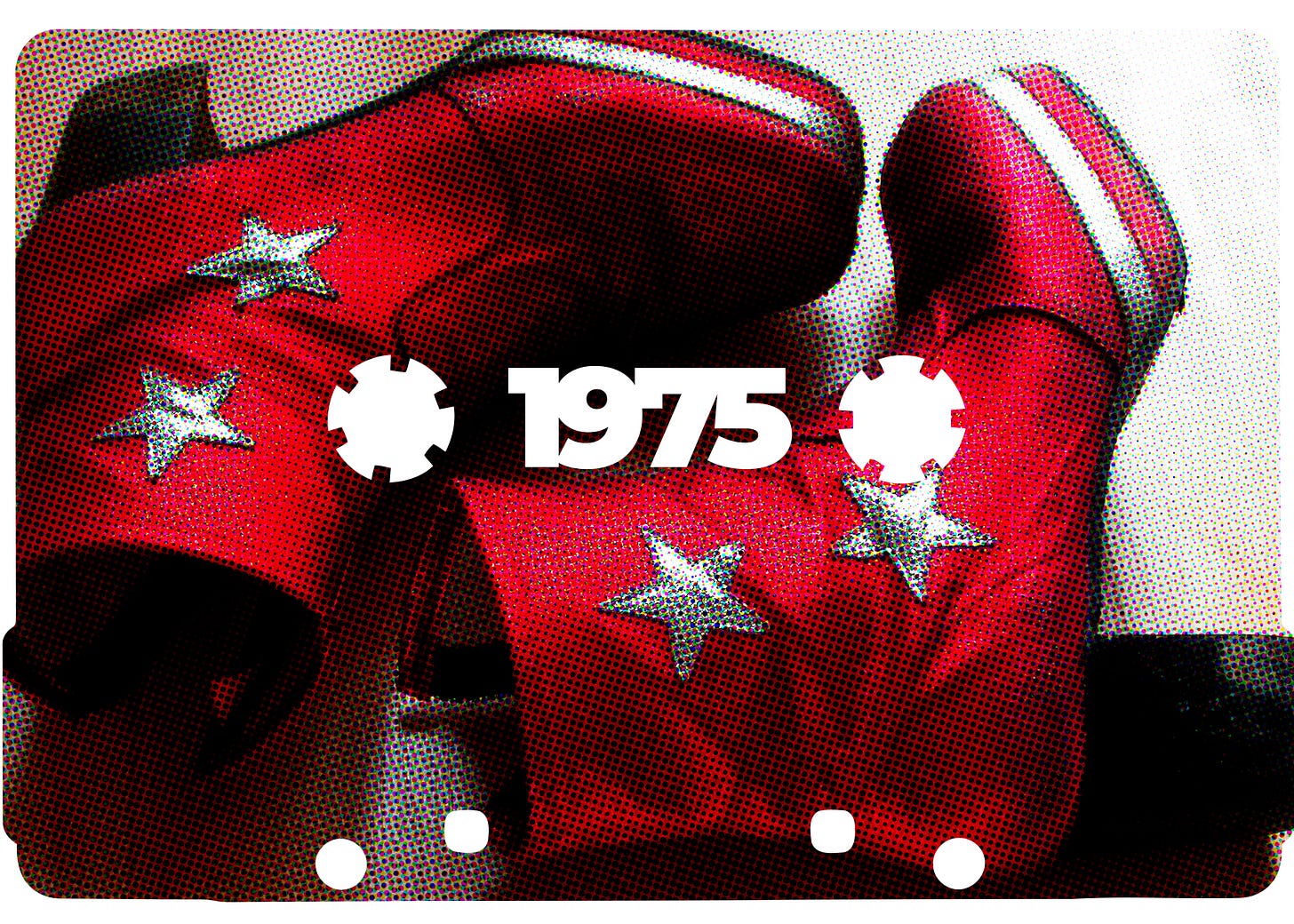Strange how potent cheap music can be. It can preserve a moment, trapped in vinyl, and it can last a lifetime, accompanying, inspiring, supporting. Year by year, these are the songs that have soundtracked our lives.
1975
Side A
‘Funky Gibbon’ - The Goodies
‘Ugly Duckling’ - Mike Reid
‘Last Farewell’ - Roger Whittaker
‘Whispering Grass’ - Windsor Davies & Don Estelle
‘Trail of the Lonesome Pine’ - Laurel & Hardy
There are a lot of comedy songs in 1975. There are songs that are meant to be funny and aren’t, like the two funkies, the Goodies’ ‘Gibbon’ and Jasper Carrott’s ‘Moped’, as well as Billy Connolly’s ‘D.I.V.O.R.C.E.’. There are the songs that (probably) aren’t meant to be funny and are, like Telly Savalas’ ‘If’ and Roger Whittaker’s histrionic ‘Last Farewell’. There’s light ‘humor’ from Loudon Wainwright III with ‘Kings and Queens’ and even career weirdo Tom Waits is still doing his barroom hobo schtick with ‘Better Off Without a Wife’. There are novelty songs like Mike Reid’s ‘Ugly Duckling’ and Jonathan King’s ‘Una Paloma Blanca’ - which is a deeply unnerving thing to listen to now, knowing what we know about him. But there are plenty of others that aren’t explicitly ‘novelty’ but still elicit a nervous chuckle: the squeamish creepiness of ‘Girls’ by The Moments and The Whatnauts, or the admittedly body-positive ‘Fattie Bum Bum’ by Carl Malcolm.
In the blasted real world these were serious times. The verdicts were being handed down in the Watergate trial; the Vietnam war was coming to an end. The Khmer Rouge seized power in Cambodia and started the killing, while all over Europe terrorist organisations like the Red Army Faction and the IRA were bombing and shooting and kidnapping. In Britain, the Conservative party had just acquired a new leader: Margaret Thatcher.
A little light entertainment was needed, and in 1975 pop music is definitely little, light, family entertainment. The grandparents can sing along to ‘Whispering Grass’, the kids can dance along to The Wombles and everyone is stirred by The Band of the Black Watch wheezily piping out ‘Scotch on the Rocks’. This is good time music for kids aged 9 to 99, and consequently not everyone is taking it entirely seriously.
In other words, pop music in 1975 was a frivolous business. All the frowny, beardy types were over on BBC2 taking The Old Grey Whistle Test, which you could only pass if you had done some serious music theory revision or had a note from your prep school headmaster. On Top of the Pops - the official celebrant of records that had actually sold by the truckload - you had sitcom stars blotting the Ink Spots and brickies in stack heels.
Side B:
‘Fox on the Run’ - Sweet
‘Make Me Smile (Come Up and See Me)’ - Steve Harley and Cockney Rebel
‘Love Is the Drug’ - Roxy Music
‘Space Oddity’ - David Bowie
‘Bohemian Rhapsody’ - Queen
In a grim political and social context, the only serious thing about both the stomp of Glam and strut of Disco is their dedication to the art of having a good time. Both genres are intrinsically silly, all outrageous outfits, outrageous tunes and outrageous dancing, and both are delightful for it.
Anyway, silliness can be subversive too. Laurel and Hardy’s rendition of ‘On the Trail of the Lonesome Pine’ from Way Out West was in the charts because the BBC had been packing the daytime schedules with their movies all year (leading to a whole generation incongruously well versed in Hal Roach silent comedies). But it got air play largely thanks to universal indie uncle John Peel, also an early champion of Roxy Music; in 1975 the Peel show featured a session from Ivor Cutler with his quiet weird tales from ‘Life in a Scotch Sitting Room’. Bowie’s ‘Space Oddity’, a re-release, is as awkward as it is brilliant, with incredibly arch arrangements and sci-fi dialogue.
There is a persistent strain of the odd and slightly silly in all the best art school and outsider music: something out of place, something too contrived. It’s a strain of pop music, inherited through Lennon and McCartney from the music halls, that displays a peculiarly British character: a reserved discomfort about sincerity and passion, a need to puncture pomposity even as it harbours grandiose ideas of its own importance.
1975 gives us one of the most silly, most splendid, most British songs of all time: ‘Bohemian Rhapsody’. It is glorious and it is daft, it is operatic and rock n’ roll and singalong, it is ludicrous and heart wrenching, and it contains, in its exorbitant length, all of the parts of the 1975 hit parade, from Freddie’s power ballad through the jaunty gibberish of random Renaissance namechecks to Brian’s electric wigout.
Under the surface of frivolous jollity there is a deep seam of twisted weirdness running through ‘70s Britain. At any moment those light ent larks might turn into something more interesting. The next year is going to bring a novelty record by a novelty band that is going to change pop music forever: ‘New Rose’ by The Damned, the beginning of punk.
A Metropolitan track listing for 1975:
‘Rhinestone Cowboy’ - Glen Campbell
‘Lovin’ You’ - Minnie Riperton
‘Isi’ - Neu!
‘Golden Years’ - David Bowie
‘I Keep a Close Watch’ - John Cale
Previously in The Metropolitan - Rowan Davies reflects on who decides what music is cool anyway:






Thanks for the memories - such an eclectic group of songs.